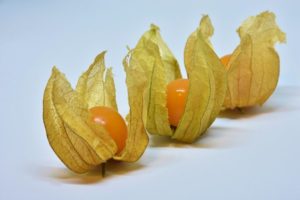Vaccines are the most effective way to prevent and eradicate infectious diseases but many vaccines have to be manufactured in cell culture or eggs, which is expensive, and most vaccines must be kept refrigerated during the transport
It takes a few years, a lot of grain and even more water to make a steer big enough to send to market - a company wants to get that process down to a few weeks.
Few people have heard of the groundcherry because during legacy days of agriculture, when foods had to be optimized for various regions as easily as possible, it fared poorly compared to other farming crops due to undesirable characteristics, like falling on the ground and needing weeds.
Though people who sell the organic process think a limited monoculture past is worth paying a premium for, the future may belong to the groundcherry and other orphan crops, thanks to biotechnology and the gene editing tool CRISPR, the successor to legacy organic processes like Mutagenesis and transgenic options like Genetically Modified Organisms.
Dog owners think dogs are exceptionally intelligent - a whole television show was made about a dog named Lassie who got humans out of all kinds of fantastic situations - while cat owners believe the same about their pets.
But are dogs smarter than other animals or pets? Not really, according to a review of over 300 papers which compared the brain power of dogs with other domestic animals, other social hunters and other carnivorans (which includes dogs, wolves, bears, lions, hyenas, and more).
On occasion there are renewed claims that even moderate alcohol consumption might "cause" breast cancer. As science advances so do claims about new ways to suggest harm. An example is recent claims about epigenetic alterations and lifestyle behaviors.
Yet there are flaws in such a simplistic approach to correlating one lifestyle option out of hundreds, like modest alcohol consumption, and breast cancer, which comprises 21 subtypes with each subtype displaying its own unique pathological signature.
Once upon a time, non-fat milk (the cream removed) was only used for fattening pigs. It was clearly a technological process to remove the cream but it is not considered "unnatural" - in 2012, the Obama administration even told schools to start serving it as a healthier alternative to regular milk. Meanwhile, the same administration delayed a salmon because it had a gene from a similar salmon that would allow it to grow all year 'round. The second technology was "unnatural."
 What Next For Messenger RNA (mRNA)? Maybe Inhalable Vaccines
What Next For Messenger RNA (mRNA)? Maybe Inhalable Vaccines Toward A Single Dose Smallpox And Mpox Vaccine With No Side Effects
Toward A Single Dose Smallpox And Mpox Vaccine With No Side Effects ChatGPT Is Cheaper In Medicine And Does Better Diagnoses Even Than Doctors Using ChatGPT
ChatGPT Is Cheaper In Medicine And Does Better Diagnoses Even Than Doctors Using ChatGPT Even After Getting Cancer, Quitting Cigarettes Leads To Greater Longevity
Even After Getting Cancer, Quitting Cigarettes Leads To Greater Longevity








